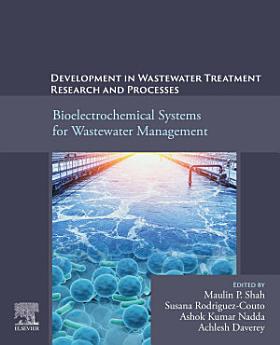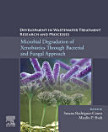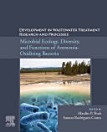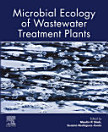Development in Wastewater Treatment Research and Processes: Bioelectrochemical Systems for Wastewater Management
About this ebook
About the author
Dr. Maulin P. Shah is an active researcher and microbial biotechnologist with diverse research interest. His primary interest is the environment, the quality of our living resources and the ways that bacteria can help to manage and degrade toxic wastes and restore environmental health. Consequently, His work has been focused to assess the impact of industrial pollution on microbial diversity of wastewater following cultivation dependant and cultivation independent analysis.
Susana Rodríguez-Couto (female) got her B.Sc. and M.Sc. in Chemistry (Industrial Chemistry) from the University of Santiago de Compostela in 1992 and her Ph.D. in Chemistry in 1999 from the University of Vigo, obtaining the maximal grade (magna cum laude) and, in addition, she was awarded with the Extraordinary Prize for Doctoral Thesis in Chemistry. She worked as an Associate Professor and an Isidro Parga Pondal Senior Researcher at the University of Vigo (2000-2004), as a Ramón y Cajal Senior Researcher at Rovira i Virgili University (2004-2008) and as an Ikerbasque Research Professor (2009-2019). She has also worked as an Invited Researcher at the Institute from Environmental Biotechnology, Graz University of Technology (Austria) and at the Department of Biological Engineering, University of Minho (Portugal). In 2008, she received the I3 Professor from the Spanish Ministry of Science and Education to the recognition of an outstanding research activity. In March 2021 she is joining LUT School of Engineering Science at Mikkeli, Finland, as a Full Professor in biological water treatment. She has published more than 140 articles in highly reputed international journals (h index 42). She is editor of several journals (3Biotech, Frontiers) and 14 Elsevier books.
Dr. Ashok Kumar Nadda is Assistant Professor in the Department of Biotechnology and Bioinformatics, at Jaypee University of Information Technology, India. His research interests are microbial biotechnology, biocatalysis, biopolymers, enzyme immobilization, bioenergy, and CO2 conversion.
Dr. Achlesh Daverey is working as an Assistant Professor in School of Environment and Natural Resources at Doon University, Dehradun, Uttarakhand, India. He has completed his M. Tech. in Bioprocess Technology from Institute of Chemical Technology (ICT) Mumbai, India in 2006 and Ph.D. in Biotechnology from Indian Institute of Technology Guwahati (IIT Guwahati), Assam, India in 2011. He worked as a post-doctoral researcher in Institute of Environmental Engineering at National Chiao Tung University, Taiwan before joining Doon University. He is serving as Editorial Board Member of SN Applied Sciences (Springer) and Review Editor for Frontiers in Bioengineering and Biotechnology, Frontiers in Environmental Science and Frontiers in Microbiology journals. His area of research includes biological wastewater treatment, anammox, phytoremediation of contaminated soil and water, waste valorization, and bioprocess design and optimization. Dr. Daverey has published 32 research papers in various internationally reputed journals and contributed 7 chapters in edited books (published by Elsevier, Springer, McGraw-Hill, American Society for Civil Engineers).







